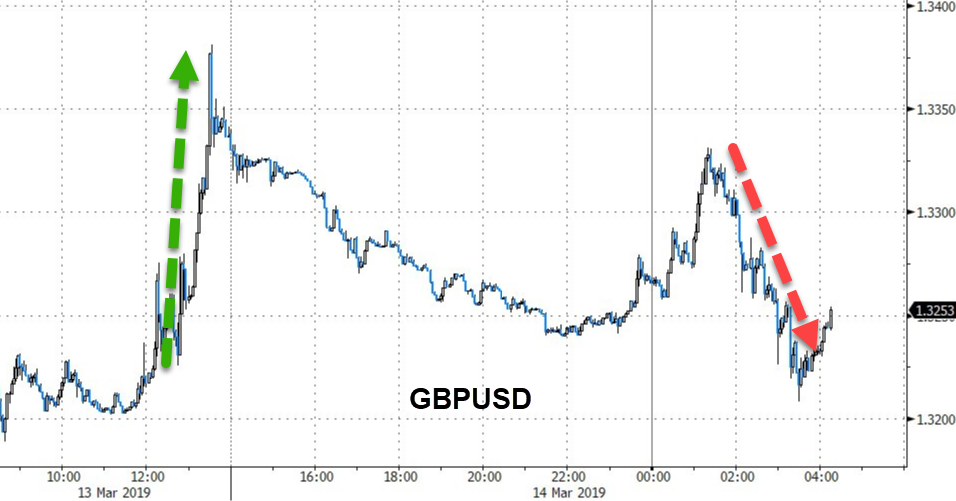Via Rabobank’s Michael Every,
UK Parliament voted against a no-deal Brexit in an indicative vote yesterday. Although this was expected, MPs backed an amendment that took no-deal off the table permanently – rather than temporary as the government intended. Sterling certainly liked the news, briefly touching 1.338 against the dollar. But risks still remain, as the 29 March deadline is approaching fast and no deal is still the default outcome unless something is agreed.
The defeat came amidst a few defiant Tory MPs, who ignored a three line whip and voted against the government. In the main vote, a total of 17 conservatives voted to take no-deal off the table, full stop, while another 11 abstained from the vote. Four of the rebels were cabinet ministers.
This is yet another loss for PM May, as discipline amongst the Tories has reached another low point. The government expects resignation letters from the ministers who voted against it, but those who abstained may be allowed to stay on. This may erode the power of this government’s future whips, although it could perhaps be argued that the MPs were confused by the complicated text of the amended motion.
Ruling out no deal permanently does leave the question “what’s next?” Today, the government will table a final indicative motion that should approve a short extension of the Brexit deadline.
However, if this vote passes in the House of Commons, the Prime Minister would still have to convince her European counterparts next week that an extension of a few months would actually lead to results.
Following the defeat, and with a “no deal” threat now taken away from her bargaining power in negotiations with the EU, PM May will have a third stab at a meaningful vote on ‘her’ deal. But after being voted down twice already, it’s hard to see why she’d expect sufficient support in another re-vote in the coming days. Perhaps she can convince some of the Brexiteers that, now ‘no deal’ is off the table as a policy option, her deal is the most attractive choice – with some of the Brexiteers dreading the alternative of having to ask the EU for a longer extension.
In this infographic, Statista’s Martin Armstrong, breaks down a selection of ‘project fear’ forecasts that paint a picture of the country in a no deal scenario.
You will find more infographics at Statista
Over the next fifteen years, the North East of England could experience a fall of 10.5 percent in gross value added (GVA) to the economy. According to Confederation of British Industry (CBI) forecasts, the region will be the worst affected, with the West Midlands and Yorkshire and the Humber in joint second with “nearly 10 percent”. Northern Ireland, which is heavily reliant on trade with the EU (74 percent of all exports), is forecast to see a 9.1 percent drop.
Figures released by the government at the end of last year forecast that, over 15 years, May’s Brexit agreement terms would have led to the economy shrinking by 3.9 percent compared to today’s arrangements. Even bleaker is of course the prospect of no deal – a devastating drop of 9.3 percent can be expected. On the job front, a report from the UK Trade Policy Observatory and the University of Sussex predicts that almost 750,000 jobs will be lost as a result of a no deal exit, representing 2.5 percent of all jobs in Great Britain.
Despite some optimism that no-deal was voted down, Asian markets weren’t in a cheerful mood. Chinese equities started the day slightly positive, but sentiment turned around after data showed further signs of slowdown in the Chinese economy. Industrial production grew only 5.3% y/y in the first two months of the year, adding to the signs that the economy is cooling down. Although consumer spending and fixed investments provide a little spark of hope, the sharp cut in industrial output may put some further pressure on the government to up their stimulus game and try to bring the trade conflict with the US to a swift end. US President Trump, meanwhile, said he is in no rush to make a deal, as he insists on stronger guarantees that US intellectual property will be respected.
Day ahead
Despite Trump’s claims that he isn’t in a hurry, the US president will remain mindful of his own economy –and especially the domestic stock market– as we get closer to campaign season for next year’s elections. Today’s home sales data may be used as another measure of US households’ confidence. With the remainder of the data calendar being empty, UK politics will again be front and center.
via ZeroHedge News https://ift.tt/2u5NFjj Tyler Durden

